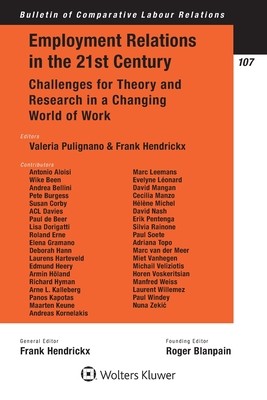
- Išsiųsime per 10–14 d.d.
- Leidėjas: Kluwer Law International
- Metai: 2019
- Puslapiai: 320
- ISBN-10: 9403517646
- ISBN-13: 9789403517643
- Formatas: 15.6 x 23.4 x 1.7 cm, minkšti viršeliai
- Kalba: Anglų
- Extra -15 % nuolaida šiai knygai su kodu: ENG15
Employment Relations in the 21st Century + nemokamas atvežimas! | knygos.lt
Atsiliepimai
Aprašymas
It cannot be denied that in recent decades, for many if not most people, work has become unstable and insecure, with serious risk and few benefits for workers. As this reality spills over into political and social life, it is crucial to interrogate the transformations affecting employment relations, shape research agendas, and influence the policies of national and international institutions. This single volume brings together thirty-nine scholars (both academics and experienced industrial relations actors) in the fields of employment relations and labour law in a forthright discussion of new approaches, theories, and methods aimed at ameliorating the world of work.
Focusing on why and how work is changing, how collective actors deal with it, and the future of work from different disciplinary angles and at an international level, the contributors describe and analyse such issues and topics as the following:
- new forms of social protection and representation;
- differences in the power relations of workers and political dynamics;
- balancing protection of workers' dignity and promotion of productivity;
- intersection of information technology and workplace regulation;
- how the gig economy undermines legal protections;
- role of professional and trade associations;
- workplace conflict management;
- lay judges in labour courts;
- undeclared work in the informal sector of the labour market;
- work incapacity and disability;
- (in)coherence of the work-related case law of the European Court of Justice; and
- business restructurings.
Derived from a major conference held in Leuven in September 2018, the book offers an in-depth understanding of the changing world of work, its main transformations, and the challenges posed to classical employment relations theories and methods as well as to labour law.
With its wide range of insights, analysis, and reflection, this unique contribution to the study of industrial relations offers an authoritative reference guide to scholars, policymakers, trade unions and business associations, human resources professionals, and practitioners who need to deal with the future of work challenges.
EXTRA 15 % nuolaida su kodu: ENG15
Akcija baigiasi už 11:43:47
Nuolaidos kodas galioja perkant nuo 10 €. Nuolaidos nesumuojamos.

- Leidėjas: Kluwer Law International
- Metai: 2019
- Puslapiai: 320
- ISBN-10: 9403517646
- ISBN-13: 9789403517643
- Formatas: 15.6 x 23.4 x 1.7 cm, minkšti viršeliai
- Kalba: Anglų
It cannot be denied that in recent decades, for many if not most people, work has become unstable and insecure, with serious risk and few benefits for workers. As this reality spills over into political and social life, it is crucial to interrogate the transformations affecting employment relations, shape research agendas, and influence the policies of national and international institutions. This single volume brings together thirty-nine scholars (both academics and experienced industrial relations actors) in the fields of employment relations and labour law in a forthright discussion of new approaches, theories, and methods aimed at ameliorating the world of work.
Focusing on why and how work is changing, how collective actors deal with it, and the future of work from different disciplinary angles and at an international level, the contributors describe and analyse such issues and topics as the following:
- new forms of social protection and representation;
- differences in the power relations of workers and political dynamics;
- balancing protection of workers' dignity and promotion of productivity;
- intersection of information technology and workplace regulation;
- how the gig economy undermines legal protections;
- role of professional and trade associations;
- workplace conflict management;
- lay judges in labour courts;
- undeclared work in the informal sector of the labour market;
- work incapacity and disability;
- (in)coherence of the work-related case law of the European Court of Justice; and
- business restructurings.
Derived from a major conference held in Leuven in September 2018, the book offers an in-depth understanding of the changing world of work, its main transformations, and the challenges posed to classical employment relations theories and methods as well as to labour law.
With its wide range of insights, analysis, and reflection, this unique contribution to the study of industrial relations offers an authoritative reference guide to scholars, policymakers, trade unions and business associations, human resources professionals, and practitioners who need to deal with the future of work challenges.




Atsiliepimai